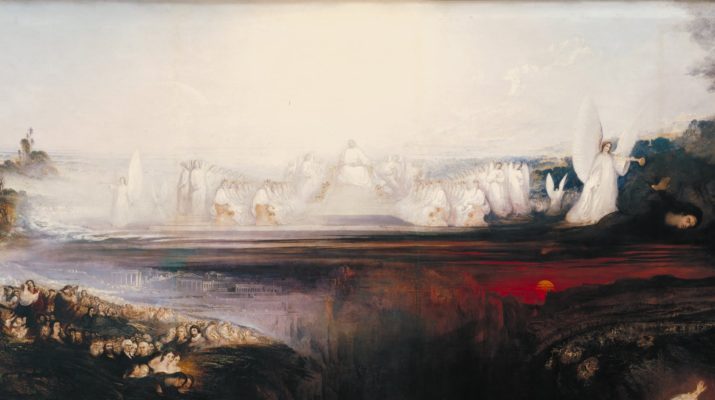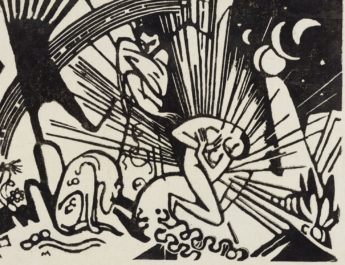Hebrews 1:1-4 & 2:5-12
Ordinary B45
1:1 Long agoA GodB spoke to our ancestorsC in manyD and various waysE by the prophets,F
A “long ago” = palai. 7x in NT. Perhaps from palin (back, again, further); probably from the same as pale (wrestling, struggle, conflict); from pallo (to sway or vibrate). This is long ago, former, ancient, in the past.
B “God” = Theos. From Proto-Indo-European origins, meaning do, put, place. This is God or a god in general.
C “ancestors” = pater. This is father in a literal or figurative sense. Could be elder, senior, ancestor, originator, or patriarch.
D “many” = plumeros. 1x in NT. From polus (much, many, high number, abundant) + meros (part, share, portion; a share literally or figuratively); {from meiromai (to receive one’s portion or allotment)}. This is in many parts, variously, and so on, at sundry times, piecemeal.
E “various ways” = polutropos. Related to “many” in v1:1. 1x in NT. From polus (see note D above) + tropos (way, manner, circumstance, style; used figuratively of character); {from the same as trope (turning, change, shifting; used figuratively for a variation); from trepo (turning or adopting a new manner)}. This is in many ways or variously.
F “prophets” = prophetes. From pro (before, in front of, earlier than) + phemi (to declare, say, use contrasts in speaking to shed light on one point of view); {from phao (to shine) or phaino (to bring light, cause to appear, shine, become visible or clear)}. This is a prophet or poet – one who speaks with inspiration from God.
2 but in these lastG days he has spoken to us by a Son,H whom he appointedI heirJ of all things, through whom he also createdK the worlds.L
G “last” = eschatos. Related to eschaton (end, last); perhaps from echo (to have, possess, hold). This is last, end, extreme, final. It is often used to discuss the end times, prophecies of the future, and the afterlife. The branch of theology focusing on all these topics is called “eschatology.”
H “Son” = huios. This is son, descendant – a son whether natural born or adopted. It can be used figuratively for other forms of kinship.
I “appointed” = tithemi. This is to put, place, set, fix, establish in a literal or figurative sense. Properly, it is placing something in a passive or horizontal position.
J “heir” = kleronomos. 15x in NT. From kleros (lot, portion, heritage; that share assigned to you; also a lot used to determine something by fate, chance, or divine will); {perhaps from klero (casting a lot) or from klao (to break in pieces as one breaks bread)} + the same as nomos (what is assigned – usage, law, custom, principle; used for the law in general or of God’s law; sometimes used to refer to the first five books of the Bible or the entire Old Testament; also used to refer to theology or the practice and tradition of interpreting and implementing the law of God); {from nemo (to parcel out, assign)}}. This is heir, inheritor, or possessor – whether literal of figurative.
K “created” = poieo. This is to make, do, act, construct, abide, or cause.
L “worlds” = aion. From the same as aei (ever, always, unceasingly, perpetually; on every occasion). This is an age, cycle of time, course, continued duration. It is also used to describe the eternal or forever. This is the word used to discuss the present age or the messianic age.
3 He is the reflectionM of God’s gloryN and the exact imprintO of God’s very being,P
M “reflection” = apaugasma. 1x in NT. From apo (from, away from) + auge (brightness, dawn; ray of light, which implies radiance). This is radiance, gleaming, someone literally shining and bright.
N “glory” = doxa. From dokeo (to have an opinion, seem, appear, suppose; a personal judgment; to think); from dokos (opinion). This is literally something that evokes a good opinion – something that connects to our understanding of intrinsic worth. The ultimate expression of this is, of course, God and God’s manifestation. So, this is opinion, honor, and dignity, but also praise, glory, renown, and worship.
O “exact imprint” = charakter. 1x in NT. From the same as charagma (stamp, engraving, sign, image, mark; an engraving or etching; figuratively, a mark that proves identity; used of an imprint on a coin or an engraver’s seal; later, it came to be mark that expressed identity much like a brand does today); from charasso (to sharpen, engrave). This is an impression, representation, or exact reproduction. It has a figurative sense of a likeness that shows inner character. Can also refer to an engraver or an engraving tool. This is where “character” comes from.
P “very being” = hupostasis. 5x in NT. From hupo (by, under, about, under authority) + histemi (to stand, place, set up, establish, stand ready, stand firm, be steadfast). Properly, this describes a person who has standing or a legitimate claim in a legal contract or agreement. It is a guaranteeing and so a support, steadiness, assurance, or confidence. It is also used figuratively to describe essence.
and he sustainsQ all things by his powerfulR word.S
Q “sustains” = phero. This is to bear, bring, lead, or make known publicly. It is to carry in a literal or figurative sense.
R “powerful” = dunamis. From dunamai (to be able, have power or ability). This is might, strength, physical power, efficacy, energy, and miraculous power. It is force literally or figuratively – the power of a miracle or the miracle itself.
S “word” = rhema. From rheo (to speak, command, make, say, speak of); from ereo (to all, say, speak of, tell; denotes ongoing speech). This is word, which implies a matter or thing spoken, a command, report, promise, thing, or business. Often used for narration, commands, or disputes.
When he had madeT purificationU for sins,V
T “made” = poieo. Same as “created” in v1:2. See note K above.
U “purification” = katharismos. 7x in NT. From katharizo (to cleanse, make clean, purify, purge, or declare to be clean; includes cleansing in a literal, ritual, or spiritual sense); from katharos (clean, clear, pure, unstained; clean in a literal, ritual, or spiritual sense; so, also guiltless, innocent or upright; something that is pure because it has been separated from the negative substance or aspect; spiritually clean because of God’s act of purifying). This is cleansing or purification. It can be used in a literal, ritual, or moral sense.
V “sins” = hamartia. Related to “many” in v1:1. From hamartano (to miss the mark, do wrong, make a mistake, sin); {from a (not) + meros (see note D above)}. Literally, this means not having one’s share or portion – like not receiving inheritance or what was allotted to you. This word means missing the mark so it is used for guilt, fault, and acts of sin.
he sat downW at the right handX of the MajestyY on high,Z
W “sat down” = kathizo. From kathezomai (to sit down, be seated); {from kata (down, against, according to, among) + hezomai (to sit); {from aphedron (a seat, a base)}}. This is to sit, set, appoint, stay, rest.
X “right hand” = dexios. Perhaps from dechomai (to warmly receive, be ready for what is offered, take, accept, or welcome; to receive in a literal or figurative sense). This is right, right side, or the right hand.
Y “Majesty” = megalosune. 3x in NT. From megas (great, large, exceeding; big in a literal of figurative sense so high, large, loud, mighty, strong, etc.). This is greatness or majesty. Always used in reference to God or Christ in the New Testament.
Z “high” = hupselos. 12x in NT– in Matthew’s and Luke’s Temptation story as well as Matthew and Mark’s Transfiguration accounts. From hupsos (height, high position, heaaven, dignity, eminence; elevation, altitude; to be exalted); from hupsi (on high, aloft); from huper (over, above, beyond). This is high, lofty, or exalted. It can be lofty in elevation or in character.
4 having becomeAA as much superiorBB to angelsCC as the nameDD he has inheritedEE is more excellentFF than theirs.
AA “become” = ginomai. This is to come into being, to happen, become, be born. It can be to emerge from one state or condition to another or is coming into being with the sense of movement or growth.
BB “superior” = kreitton. 15x in NT. From the same as kratistos (strongest, noblest – high in dignity or honor; used to speak to a high ranking Roman; can also differentiate an equestrian from a senator); from kratus (strong); from kratos (strength, power, dominion; vigor in a literal or figurative sense; power that is exercised). This is stronger, better, more dominant or nobler. It is better in the sense that it is mastered or developed.
CC “angels” = aggelos. Probably from ago (to lead, bring, carry, guide) + agele (flock, herd, drove); {also from ago (see above)}. This is angel or messenger. Properly, it is one sent with news or to perform a specific task. This messenger can be human or an angel from heaven. More commonly, it is used for angels in the New Testament.
DD “name” = onoma. May be from ginosko (know, recognize, learn from firsthand experience). This is a name, authority, cause, character, fame, reputation. The name was thought to include something of the essence of the person so it was not thought to be separate from the person.
EE “inherited” = kleronomeo. Related to “heir” in v1:2. 18x in NT. From kleronomos (see note J above). This is to acquire or get by inheriting.
FF “more excellent” = diaphoros. Related to “sustains” in v1:3. 4x in NT. From diaphero (to carry through as in all the way to the end; differing or fully distinguishing – separating by comparison; literally, to transport – figuratively to report or surpass); {from dia (through, because of, across, thoroughly) + phero (see note Q above)}. This is to different or diverse. It can also be excellent or surpassing.
2:5 Now God did not subjectGG the comingHH world,II about which we are speaking, to angels.
GG “subject” = hupotasso. From hupo (by, under, about, under one’s authority) + tasso (to arrange, appoint, determine). This is to place under. So it is to subject, submit, obey, or subordinate.
HH “coming” = mello. Perhaps from melo (something that one is worried or concerned about, something one pays attention to or thinks about). Properly, this is ready, about to happen, to intend, delay, or linger. This is just on the point of acting.
II “world” = oikoumene. 15x in NT. From oikeo (to settle or be established somewhere in a permanent way, to make a home or live at home); from oikos (house – the building, the household, the family, descendants; the temple). This is the world – the part where people live. It was used specifically for the Roman world. It is the root of the word “ecumenic.”
6 But someone has testifiedJJ somewhere,
“What are human beingsKK that you are mindfulLL of them,
or mortals,MM that you careNN for them?
JJ “testified” = diamarturomai. 15x in NT. From dia (through, across to the other side, thoroughly) + marturomai (to witness, testify, call as a witness, affirm, charge, protest); {from martus (a witness whether having heard or seen something; witness literally, judicially, or figuratively; by analogy, a martyr)}. This is to affirm, give evidence, testify thoroughly. It is giving full testimony.
KK “human beings” = anthropos. Probably from aner (man, male, husband) + ops (eye, face); {from optanomai (to appear, be seen); perhaps from horao (become, seem, appear)}. This is human, humankind. Used for all genders.
LL “are mindful” = mimnesko. From mnaomai (to remember; by implication give reward or consequence); perhaps from meno (to stay, abide, wait, endure). This is to remind or remember. It is memory through an active, intentional process or being mindful of. It is not incidentally or accidentally remembering.
MM “mortals” = huios + anthropos. Literally, “son of human.” Huios is the same as “Son” in v1:2. See note H above. Anthropos is the same as “human beings” in v2:6. See note KK above.
NN “care” = episkeptomai. 11x in NT. From epi (on, upon, at, what is fitting) + the base of skopos (a mark or goal like the marker at the end of a race; figuratively, other goals or destinations; also, a watch or sentry); {from skeptomai (to peer out, consider, gaze carefully); perhaps related to skapto (to dig or excavate)}. This is to look at, look out for, see, select, visit.
7 You have made them for a littleOO while lowerPP than the angels;
you have crownedQQ them with glory and honor,RR, SS
8 subjecting all things under their feet.”TT
OO “little” = brachus. 7x in NT. This is little, few, small area, short interval of time.
PP “made…lower” = elattoo. 3x in NT. From elasson (smaller, worse, younger, lesser quality); from elachistos (smallest or littlest in the sense of size, amount, rank, dignity, and so on); from elachus (short); used as a superlative for mikros (small). This is to lesson or reduce in status or influence.
QQ “crowned” = stephanoo. 3x in NT. From stephanos (something that surrounds i.e. a crown or garland; properly, the wreath or garland that the winner of athletic games would win; symbolized victory and honor from skill as contrasted with a royal crown, which is diadema in Greek); stepho (to twine, encircle). This is to crown or decorate. It is not the crown associated with royalty, but the one awarded to one who has won a prize – e.g. the winner of a race.
RR “honor” = time. From tino (to pay, be punished, pay a penalty or fine because of a crime); from tio (to pay respect, value). This has to do with worth or something’s perceived value. Literally, it means price, but figuratively, it means the honor or value one sees in someone or something else. It can be esteem or dignity. It can also mean precious or valuables.
SS Some manuscripts add, “and set them over the works of your hands” = kai + kathistemi + autos + epi + ho + ergon + ho + cheir + su. Kathistemi is related to “very being” in v1:3. From kata (down, against, throughout, among) + histemi (see note P above). This is to appoint, set in order or set in place, constitute, give standing or authority, put in charge, designate. Ergon is from ergo (to work, accomplish, do). This is work, task, deed, labor, effort. Cheir is the hand in a literal sense. Figuratively, the hand is the means a person uses to accomplish things so it can also mean power, means, or instrument.
TT “feet” = pous. This is foot in a literal or figurative sense.
Now in subjecting all things to them, God leftUU nothing outside their control.VV As it is, we do not yet seeWW everything in subjection to them,
UU “left” = aphiemi. From apo (from, away from) + hiemi (to send). This is send away, release, permit, forgive, allow to depart, discharge, or send forth.
VV “outside their control” = anupotaktos. Related to “subject” in v2:5. 4x in NT. From a (not, without) + hupotasso (see note GG above). This is literally not subject. So, it is disobedient or rebellious. It could be anti-authoritarian or one who resists God’s will or one who is more generally unruly.
WW “see” = horao. Related to “human beings” in v2:6. See note KK above.
9 but we do seeXX Jesus,YY who for a little while was made lower than the angels, now crowned with glory and honor because of the sufferingZZ of death,AAA so that by the graceBBB of God he might tasteCCC death for everyone.
XX “see” = blepo. This is literally to see – it is primarily used in the physical sense. However, figuratively it can be seeing, which includes attention and so to watchfulness, being observant, perceiving, and acting on the visual information. It can also mean beware.
YY “Jesus” = Iesous. From Hebrew Yehoshua (Joshua, the Lord is salvation); {from YHVH (proper name of the God of Israel; the self-existent and eternal one); {from havah (to become) or from hayah (to come to pass, become, be)} + yasha (to deliver, defend, help, preserve, rescue; properly, to be open, wide or free, which implies being safe. So, in a causative sense, this is to free someone)}. This is Jesus or Joshua in Greek – the Lord saves or the Lord is salvation.
ZZ “suffering” = pathema. 16x in NT. From pathos (passion, lust, suffering, something that happens to you, strong feelings); from pascho (to be acted on for good or ill; often used for negative treatment; properly, feeling strong emotions – especially suffering; can also be the ability to feel suffering). This is something that happens to you such as suffering, affliction, passion, or emotion. It can also be one’s capacity for deep feelings or enduring. Further, it can be hardship or pain.
AAA “death” = thanatos. This is death, whether literal or spiritual. It can also refer to something that is fatal.
BBB “grace” = charis. From chairo (to rejoice, be glad; used to say hello; properly, delighting in the grace of God or experiencing God’s favor); from char– (to extend favor, lean towards, be inclined to be favorable towards). This is grace, kindness, favor, gratitude, thanks. It is the sense of being inclined to or favorable towards – leaning towards someone to share some good or benefit. This can be literal, figurative, or spiritual. It is grace as abstract concept, manner, or action.
CCC “taste” = geuomai. 15x in NT. This is to taste, which implies eating. It can be used figuratively to mean experience, whether positively or negatively.
10 It was fittingDDD that God, for whom and through whom all things exist, in bringingEEE manyFFF childrenGGG to glory
DDD “was fitting” = prepo. 7x in NT. This is fitting, suitable, conspicuous, proper.
EEE “bringing” = ago. Related to “angels” in v1:4. See note CC above.
FFF “many” = polus. Related to “many” and “various ways” in v1:1. See note D above.
GGG “children” = huios. Same as “Son” in v1:2. See note H above.
should make the pioneerHHH of their salvationIII perfectJJJ through sufferings.
HHH “pioneer” = archegos. Related to “angels” in v1:4 & “bringing” in v2:10. 4x in NT. From archo (to rule, begin, have first rank or have political power) + hegeomai (to think, suppose, have an opinion; to lead the way, what comes in front or first, initial thought, high esteem or authority; one who commands in an official capacity); {from ago (see note CC above)}. This is leader, founder, captain – someone who begins or pioneers a movement with followers.
III “salvation” = soteria. From soter (a savior, deliverer); from sozo (to save, heal, preserve, or rescue; taking someone from danger to safety; delivering or protecting literally or figuratively); from sos (safe, rescued, well). This is deliverance, salvation, preservation, welfare, prosperity, safety.
JJJ “make…perfect” = teleioo. From teleios (going through the steps to complete a stage or phase and then moving on to the next one; reaching an end and so being complete or “perfect”; also full grown or mature); from telos (an end, aim, purpose, completion, end goal, consummation, tax). This is finish, accomplish, bring to an end, complete, reach a goal, finish a race, to consummate. It refers to completing stages or phases to get to an ultimate conclusion. It can also mean consecrate or fulfill.
11 For the one who sanctifiesKKK and those who are sanctified all have oneLLL Father. For this reasonMMM Jesus is not ashamedNNN to callOOO them brothersPPP and sisters,
KKK “sanctifies” = hagiazo. From hagios (sacred, holy, set apart, different other; physically pure, morally blameless, or ceremonially set apart); from hagnos (holy, sacred, pure ethically, ritually, or ceremonially; prepared for worship, chaste, unadulterated, pure to the core; undefiled by sin; figurative for innocent, modest, perfect). This is to make holy, consecrate, sanctify, set apart as holy, purify, venerate.
LLL “one” = heis. This is one, a person, only, some.
MMM “reason” = aitia. From aiteo (to ask, demand, beg, desire). This is a cause or reason. It can also be a legal crime, accusation, guilt, or case.
NNN “ashamed” = epaishcunomai. 11x in NT. From epi (on, upon, against, what is fitting) + aischuno to dishonor, put to shame, shrink, disfigure); {from aischos (shame, disgrace, disfigurement)}. This is to be ashamed or disgraced. It is a personal humiliation or dishonor – a shame that matches an error.
OOO “call” = kaleo. Related to keleuo (to command, order, direct); from kelomai (to urge on). This is to call by name, invite, to name, bid, summon, call aloud.
PPP “brothers” = adelphos. From a (with, community, fellowship) + delphus (womb). This is a brother in a literal or figurative sense. It is also used of another member of the Church.
12 saying,
“I will proclaimQQQ your name to my brothers and sisters,
in the midstRRR of the congregationSSS I will praiseTTT you.”
QQQ “proclaim” = apaggello. Related to “angels” in v1:4 & “bringing” and “pioneer” in v2:10. From apo (from, away from) + aggello (to announce, report); {from aggelos (see note CC above)}. This is to report, declare, bring word. It is an announcement that emphasizes the source.
RRR “midst” = meso. Perhaps from meta (with among, behind, beyond; implies a change following contact or action). This is middle, among, center, midst.
SSS “congregation” = ekklesia. Related to “call” in v2:11. From ek (from, out from) + kaleo (see note OOO above). This is properly a calling out or an assembly. It was used to refer to a church.
TTT “praise” = humneo. 4x in NT. From humno (hymn, song to praise God, religious ode; also used in other faiths as songs that celebrated their gods, heroes, etc.); from hudeo (to celebrate). This is singing a hymn or religious ode, to praise or celebrate God.
Image credit: “The Last Judgment” by John Martin, 1853.




